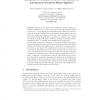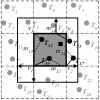47 search results - page 5 / 10 » Policy-Aware Sender Anonymity in Location Based Services |
136
Voted
SSD
2007
Springer
15 years 8 months ago
2007
Springer
Abstract. Modern mobile phones and PDAs are equipped with positioning capabilities (e.g., GPS). Users can access public location-based services (e.g., Google Maps) and ask spatial ...
206
click to vote
VLDB
2006
ACM
17 years 1 months ago
2006
ACM
This paper tackles a major privacy concern in current location-based services where users have to continuously report their locations to the database server in order to obtain the ...
SP
2006
IEEE
15 years 7 months ago
2006
IEEE
The MIX technique forms the basis of many popular services that offer anonymity of communication in open and shared networks such as the Internet. In this paper, fundamental limit...
102
click to vote
IJISEC
2007
15 years 1 months ago
2007
Universal Re-encryption allows El-Gamal ciphertexts to be re-encrypted without knowledge of their corresponding public keys. This has made it an enticing building block for anonymo...
108
click to vote
WMCSA
2009
IEEE
15 years 8 months ago
2009
IEEE
There is an inherent tension between the value provided by Location-Based Services (LBSs) and the location-privacy concerns they raise. Unfortunately, users are often forced to ei...


